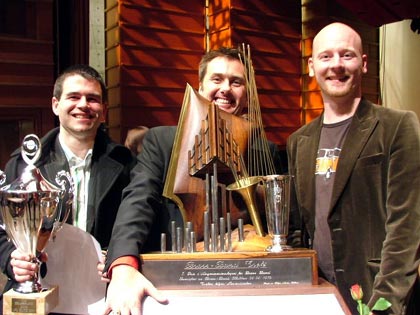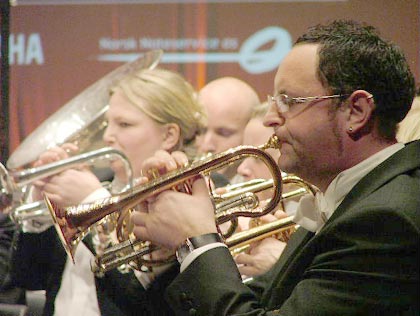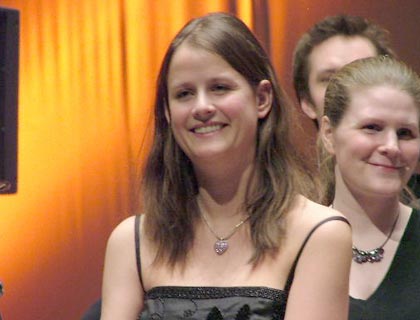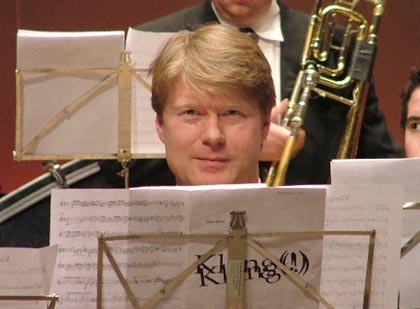2006 Norwegian National Championships - Postcard from Bergen
15-Feb-2006The Norwegians do a lot of things right, but could there be the first signs of a cyncial approach to a Championship born out of innocence?

That's what it was all about: Stavanger players enjoy that winning feeling
The one thing you can be guaranteed about when you come to the Norwegian National Championships, is that you will be well looked after.
The hospitality is warm and friendly, but allied to a very professional approach to the way in which they wish to present themselves to the wider world. The Norwegian Music Federation is well funded and as a result is able to develop its brass band movement with effective long term aims and objectives. There is much to admire about how the National Championships are put on here, and although not everything is as it should possibly be, there is a great deal that we in Britain could copy and develop along our own lines.
We had a lovely night on the Saturday when we were invited with the great and good to the post-match free nosh and plonk. The hosts put on a great show, and it was very interesting to hear (and we weren't too drunk by then) that the Regional Government awards the equivalent of £10,000 to each Elite Section band each year to help with their development.
The night was also a delight for the way in which the results and prize giving ceremony was handled too. Prior to the announcement, Eikanger gave a short mini concert, which featured some of the slickest playing you could ever hear under the baton of Reid Gilje, and Martin Winter standing up to let rip with such brilliance that you were dumstruck with awe. He was later joined by the three solo cornets of the band to play the music from ‘The Green Hornet' with such panache that it startled your senses – especially when he decided to take the tune up an octave!

The main man: Martin Winter warms his lip up for his little solo spot!
4BR entered the spirit of things by being allowed to present the band with their prize for their CD ‘Tales and Stories' being voted our 2005 CD of the Year. The 4BR Editor even launching into Norwegian, with almost comic and potentially horrendous results at one point, as the pronunciation of CD having to be specifically monitored as it can sound very much like a word you wouldn't want to place into conversation with you local vicar.
The results ceremony itself has much to be admired. Eikanger remained on stage right up to the announcement of the First Section results and fanfared the band representatives onto the stage, whilst all participants received a single red rose from the organisers (an early Valentines Day present perhaps?). They then stood as the full results (and we mean the full results) were announced for their section and simultaneously shown on the back drop of the hall for all to see. There were a few oohs and aahs of course, but it was all done in a lovely friendly way, with the final three representatives left on stage for the announcement of the top three positions.

A friendly smile: Ila's solo cornet player enjoys the Championships
Add to that the continued ‘open' approach to the contests with judges in the open in the Third and Fourth Sections, and with a quality compere using the time between the bands to inform the audience of the pieces they are to play, something about the bands and their conductors and even a few well crafted jokes, and you can see why there is a very vibrant feel to the contests here. It is rumoured that the question of open adjudication will be discussed again, and that there is a real possibility that next year at least one other section will be brought into the 21st Century.
It was neat and clever and should be done here in the UK.
Although there was surprise about the results in the Elite Section, it wasn't borne out of sheer ignorance by the audience. The Grieg Hall with it huge red tongue of a roof was about two thirds full throughout the Friday evening when the bands played Orjan Matre's enjoyable ‘Klang(!).
There is a much more open acceptance of contemporary works here, even those that come right out of left field, and the deliberate policy from the organisers to encourage domestic talent to write for the medium must be congratulated. It doesn't always work, and there is a need for the Norwegian bands to try and master more of the older works of the banding movements past. Too many are technically brilliant, but musically bankrupt and too many play with a ‘dead' sound, both as an ensemble and as individuals. Bands and MDs in the UK can rightly be accused of playing with too much rubato at times, but in Bergen this year you really could have counted the times that it was employed naturally and without contrivance, on the fingers of one hand.
As we have said, there are things that the Norwegians haven't quite got right as yet.
The Norwegian Brass Band Championships were born out of optimism and innocence. In the 27 years since the first contest in 1979 it has grown into a remarkably mature and sophisticated event, although in many ways it still retains a sense of naivety.
Unburdened buy the weight of 150 years of contesting sceptisicm and distrust that has at times blighted the movement here in the UK, its liberal approach to the competitive environment of its National Contest has been one of its most welcoming features.
Building an utopian brass band contest is impossible however, and in Bergen this year there were the first signs that the age of Norwegian innocence is coming to pass, and a world weary sense of cynicism may well be starting to creep into the event.
The liberal interpretation of written and unwritten rules has underpinned the approach of the organisers to encourage bands to compete at the Championships. For instance, bands are allowed to apply to play either first or last in the contest due to exceptional circumstances such as work commitments or sickness. It is a sensible and mature approach.
Equally, there has never been a written rule concerning players swapping instruments; a convention that has allowed soprano players to use Eb trumpets or a band without a flugel horn to allow a cornet player to play two instruments. Again, a flexible arrangement designed to help bands compete.
Additionally, the audience has been encouraged to show support for competing bands as they take to the stage, whilst at the end of performances, this has led to an appreciation that is warm, at times loud and vocal, but invariably, genuine. It makes for a great atmosphere.
Finally, the organisers have encouraged indigenous composers to write new compositions for the contest – a policy that enables bands to use them as their own choice selections. This year, two new contemporary works being given their world premiere in the Elite Section.

Norwegian Swap Shop: Sandefjord's solo baritone gets ready to become a solo euph
At this years contest, the Eikanger Band requested to play last in the set work section due to work commitments of one of its percussionists – a request accepted by both their fellow competitors and the organisers, whilst the performance of the Sandefjord Band saw the baritone and euphonium players swap instruments to allow the former to perform the demanding euphonium solo, then revert back to his instrument straight after.
In addition, the Manger Band performed a new contemporary work by Torstein Aagaard Nilsen, which at its conclusion saw the composer himself invited on stage with the band to accept the applause of the audience, whilst a number of bands took the opportunity make their entry to perform in a manner that can only be described as making a funeral procession seem like a military two step and ended with curtain calls that the great Norwegian soprano singer Kirsten Flagstad would have blushed at.
There is not a scintilla of doubt that any band used their individual circumstances for undue advantage, but the sceptics amongst the traveling UK press and observers could immediately see the potential for accusations of ‘gamesmanship' or the development of a ‘win at all costs' attitude in an unguarded future.
Bogus illnesses or work commitments to eradicate the chance of the dreaded number one draw; the cynical use of star players to play the most difficult individual solo lines; the use of compositions to appeal to the make up of the adjudicators rather than enhance the musical experience of the audience or realistically develop the banding repertoire; or the use of tasteless theatricality to encourage a Pavlovian response from an audience.
It would be a great pity if the characteristics that have made the Norwegian Championships such an enjoyable brass band event, were to be undermined by such cynicism. Neither the Norwegians nor the banding world as whole deserve such a fate.
Iwan Fox















